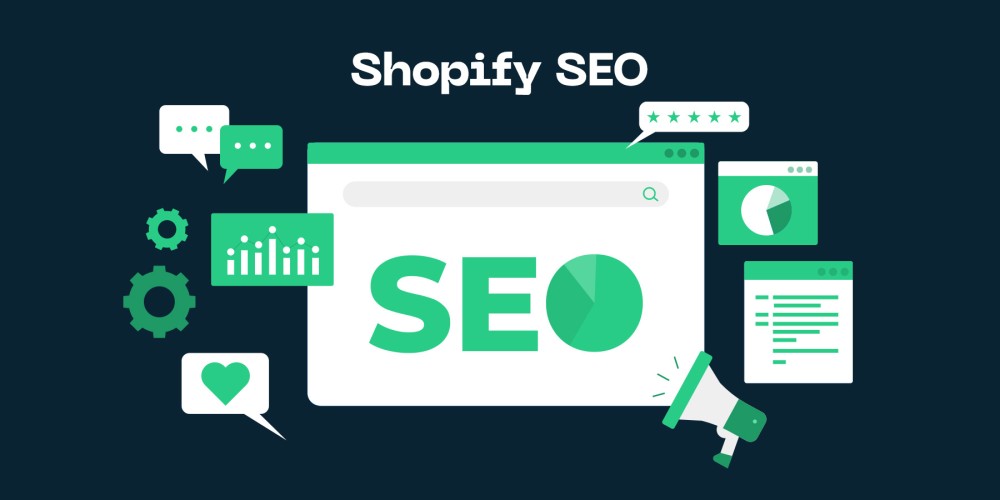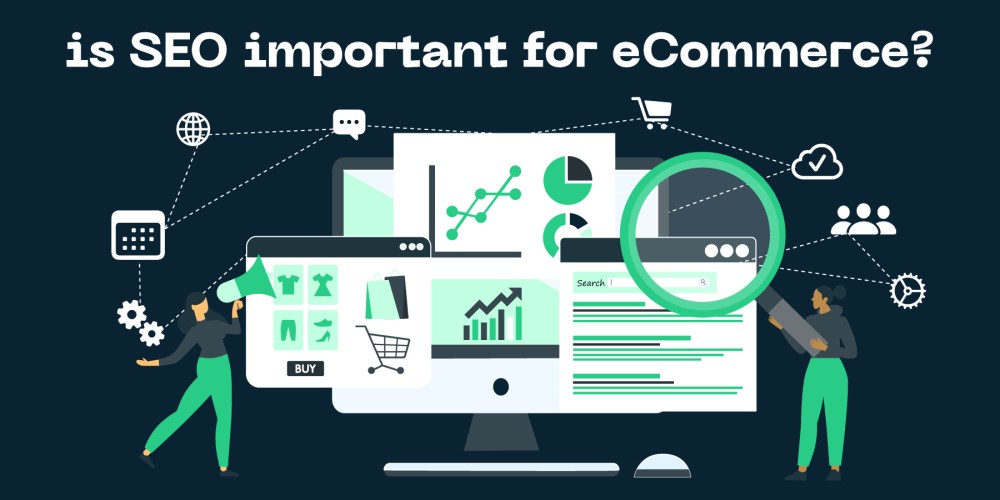3 Game-Changing SEO Strategies You’re Missing in Your Shopify Store

Key Takeaways
- SEO is essential for Shopify stores, with strategies focusing on enhancing user experience and site visibility to increase traffic and conversions.
- Efficient technical SEO, usage of Shopify’s built-in SEO capabilities, and strategic keyword targeting form a robust foundation for improving a store’s search ranking.
- Content quality, strategic link building, and conversion optimization are key to attracting and retaining customers, coupled with continuously adapting to SEO trends and algorithm updates.
Unlocking Shopify SEO: The Key to E-Commerce Success

When it comes to e-commerce success, SEO is a game-changer. It’s like the secret ingredient that spices up your Shopify store, making it more visible to your target audience in the vast digital marketplace. But why is SEO so crucial for your Shopify store? Let’s delve deeper.
SEO is the best value-for-money channel to produce customers for your Shopify store. By applying SEO tactics, you can significantly improve user experience and site visibility. This dual benefit is crucial for increasing traffic and conversion rates on your Shopify store. Imagine your online store as a physical shop. SEO is akin to an attractive storefront that not only catches the eye of potential customers but also guides them through your store, enhancing their overall shopping experience.
The purpose of this Shopify SEO guide is to outline strategies for improving your store’s ranking. A higher ranking in search results means higher visibility, which in turn leads to more organic traffic and potential sales. In other words, mastering Shopify SEO is like unlocking a treasure trove of opportunities for your e-commerce site.
Crafting a Solid Foundation: Technical SEO for Your Shopify Site

Before we dive into the nitty-gritty of Shopify SEO, let’s lay the groundwork with technical SEO. What is technical SEO, you ask? It’s the behind-the-scenes hero that optimizes your Shopify website for search engine crawlers, enhancing the overall user experience. Essentially, technical SEO ensures your website speaks the ‘language’ of search engines, making it easier for them to:
- crawl and index your site
- understand the structure and organization of your website
- identify and prioritize relevant content
- improve website speed and performance
Adding your Shopify store to Google Search Console is a fundamental step in setting up technical SEO. This tool is like your personal health tracker for your site, identifying errors and issues with indexing, visibility, and performance. Additionally, securing your Shopify store with HTTPS not only ensures favorable ranking by search engines but also builds user trust in your site’s safety.
Streamlining Site Structure for Optimal Performance
A well-structured website is like a well-organized store: it allows users to find what they’re looking for with ease. A logical site structure aids users and search engines in finding and understanding pages, which is essential for SEO. But how do you create a streamlined site structure?
The answer lies in efficient navigation. A good navigation structure translates to:
- Longer user stays on the site
- A significant improvement in Shopify store ranking
- Better user engagement
- Reduced bounce rates
Enhancing website navigation leads to better user engagement and reduced bounce rates, which positively impacts your store ranking. Think of it as a GPS for your site; it guides users to their desired destination, ensuring they don’t get lost in the myriad of pages.
Another tool in your arsenal for streamlining site structure is breadcrumb navigation. This handy feature aids in understanding site hierarchy for both users and search engines and should be implemented in Shopify themes.
Lastly, don’t forget about responsive website design. Given the increasing use of mobile devices, responsive design is a key ranking factor for search engines, including other search engines, as it provides a better user experience, adapting to SEO trends.
Leveraging Shopify's Built-In SEO Features
Did you know that Shopify comes with a suite of built-in SEO features that can give your store a leg up in the SEO game? From generating canonical tags to creating sitemap.xml and robots.txt files, Shopify handles essential technical SEO setups out of the box, providing a solid foundation for your SEO efforts.
Shopify’s default behavior is to canonicalize product variants to the main product URL. This helps consolidate and optimize search engine indexing for the product. This smart feature prevents duplicate content issues that could harm your SEO. Moreover, Shopify’s free themes even offer built-in structured data for product pages to enhance visibility with rich snippets.
One of the tools you can leverage for further optimization is ConvertMate app. This app is like a personal SEO assistant. It generates relevant meta tags for your product images, improving SEO with accurate and search-friendly information.
Additionally, it uses JSON-LD data structured in a way that search engines prefer, giving your site a competitive edge.
Mastering Keyword Mastery: Target Keywords That Convert

Keywords are the essence of SEO. Choosing the right keywords is like choosing the right ingredients for a recipe – they can make or break your SEO efforts. Conducting keyword research is essential for SEO success as it directly influences the visibility of your eCommerce store in search results by aligning content with what users are searching for.
But how do you find the right keywords? Enter ConvertMate, the highest-rated Shopify tool for SEO. With ConvertMate, you can optimize your pages through detailed keyword research, analyzing live search volume and competition data. This essential tool empowers store owners to pick the right keywords that have a higher probability of conversion.
Remember, keyword research isn’t a one-time task. It’s an ongoing process that requires constant monitoring and revisiting. To conduct keyword research effectively, tools like Ahrefs provide a reliable starting point for finding potent keywords that can significantly increase traffic to Shopify stores. These tools are like your SEO compass, guiding you towards the most effective keywords for your store.
Mapping Out Keywords to Maximize Visibility
Once you have the right keywords, the next step is to map them out. This process involves:
- Understanding the topic behind a keyword
- Ensuring that the content is relevant and matches search intent
- To determine the search intent of a keyword, observe whether the top SERP results are dominated by articles or product pages.
Keyword clusters can be obtained using tools like ConvertMate's Keyword Manager. These clusters help in mapping out keywords to pages, ensuring your content aligns with what potential customers are searching for.
When targeting branded products on your Shopify store, focus on the target keyword with sufficient search volume that is highly relevant to the product. This approach ensures that your product pages rank higher in search results, attracting more targeted traffic and increasing the likelihood of conversions.
On-Page SEO: Making Every Word Count

On-page SEO is all about making every word count. It’s like dressing up your website for the party that is the search engine results pages. By optimizing on-page elements like meta titles, meta descriptions, product descriptions, and headings, you can improve your search engine rankings and user engagement through search engine optimization.
Your URLs, title tags, and headings should be enhanced with relevant keywords to better reflect the page’s content and improve SEO. Think of these elements, along with the meta description, as the name tag, title, and description of your product in a brick-and-mortar store. They need to be catchy, descriptive, and relevant to grab the shopper’s attention. Crafting effective meta descriptions is an essential part of this process.
Shopify store owners can manually edit product descriptions to make them unique and incorporate relevant keywords, further optimizing each product page. Just like a salesperson in a physical store, your product descriptions should be engaging, informative, and persuasive to convert visitors into customers.
Enhancing Product Page Appeal
A well-optimized product page can do wonders for your SEO and user engagement. It’s like a well-lit display window that showcases your product in the best light. Product descriptions should be unique, engaging, and incorporate transactional keywords relevant to the product to boost SEO and user engagement.
Consider adding a FAQ section to your product pages. This provides additional keyword-rich content that can further enhance the SEO of product pages and improve customer trust. Think of it as a helpful sales assistant who answers customer queries and reassures them about their purchase decision.
Also, pay attention to your meta titles and descriptions. They should include targeted keywords while maintaining clarity and relevance directed towards users and search algorithms. Furthermore, optimize product page URLs by keeping them short, including the product name, and ensuring specificity for both readability and SEO performance. After all, an easy-to-read URL is like an easy-to-follow map – it guides users and search engines to the right destination.
Building Authority: Strategic Link Building Practices
Just as the saying goes, “it’s not what you know, it’s who you know,” in the world of SEO, it’s not just about having great content, but also about who’s linking to it. Quality backlinks significantly contribute to the SEO of a Shopify store.
But how do you gain quality backlinks? There are several strategies you can employ. For instance, you can seek listings on product manufacturers’ websites, participate in online communities, or leverage linkable assets such as research studies or free tools.
The credibility and trustworthiness of backlinks are paramount. Links from high-authority sites like CNN or established companies have a larger impact on ranking compared to links from low-quality or social media sites. By consistently building high-quality backlinks, you can maintain a competitive edge in the SEO landscape.
The Art of Crafting Shareable Content
Creating shareable content is both an art and a science. It involves producing engaging and valuable content that resonates with audiences and earns share-worthy backlinks. Incorporating effective storytelling can significantly enhance the appeal of your content, making it more engaging than routine product descriptions. Think of your content as a captivating story that keeps your audience hooked, increasing their likelihood of sharing it.
Blog posts that address the audience’s problems and provide actionable solutions tend to be more compelling. By offering valuable insights, you establish a trust-based relationship with your audience, encouraging them to share your content and return for more.
Content is King: Driving Traffic with Blog Content

In the realm of SEO, content is indeed king. High-quality, engaging content not only improves visibility but also engages visitors, enhancing both brand knowledge and search engine rankings.
Shopify provides an out-of-the-box blogging platform, allowing store owners to integrate blog content seamlessly into their ecommerce site. Blogging about niche topics and customer queries attracts targeted search traffic, as content aligns with what potential customers are searching for.
Using tools like SEO Writing Assistant and developing a content marketing strategy can enhance a site’s SEO by addressing customer questions and adapting to SEO trends. By creating content that resonates with your audience and aligns with their search queries, you can significantly boost your Shopify store’s visibility and traffic.
Creating Content That Resonates
Creating content that resonates with your audience is like striking a chord on a guitar. It creates a sound, a harmony that your audience can connect with. This involves offering valuable content that addresses customer questions, thereby establishing a trust-based relationship.
Diversifying content delivery through written articles, visuals, videos, and audio can enhance backlink attraction and build audience engagement. It’s like offering a buffet of content formats, catering to different audience preferences.
Staying current with industry trends and updating content regularly ensures ongoing relevance and sustains your blog’s ranking in search engine results. After all, in the fast-paced world of SEO, staying updated is the key to staying ahead.
Conversion Optimization: Turning Visitors into Customers
Driving traffic to your Shopify store is just half the battle won. The other half lies in turning these visitors into customers. This is where conversion optimization comes into play. The Adoric Shopify App can be used to create enticing marketing campaigns, using popups, slide-ins, and floating bars to turn site visitors into customers or subscribers. Moreover, Adoric’s exit-intent technology can help reduce cart abandonment by capturing the user’s attention before they leave the site.
A/B testing enables e-commerce stores to systematically test and adapt elements like:
- Imagery
- CTAs
- Checkout options
- Content
to enhance the likelihood of converting visitors into customers. By improving navigation, providing clear FAQs, and offering live chat functionality, you can contribute significantly to higher conversion rates.
Utilizing ConvertMate for Enhanced SEO and Conversions
ConvertMate is like an ace up your sleeve when it comes to SEO and conversions. It streamlines SEO on Shopify stores by automating multiple optimization processes such as AI content generation, bulk editing, and URL optimization.
With features like AI generation for content and bulk editing tools, ConvertMate enables precise keyword optimization and enhances content relevance for product pages.
Moreover, ConvertMate’s capabilities extend to A/B testing, allowing for data-driven SEO performance enhancements that can fine-tune on-page elements. By using ConvertMate’s automated SEO and A/B testing features, Shopify stores can see improved SEO rankings and conversions due to more targeted and relevant content.
Staying Ahead of the Curve: Adapting to SEO Trends and Algorithm Updates
In the dynamic world of SEO, staying updated with trends and algorithm changes is crucial. It’s like keeping up with the latest fashion trends to stay relevant and stylish. Staying ahead of the curve involves utilizing SEO tools for regular audits, keeping track of rankings, and analyzing competitors’ keywords to enhance site visibility. It’s like staying vigilant and proactive in a highly competitive marketplace.
Continuous monitoring of website traffic and search performance is essential for SEO adaptation, and this can be achieved through tools like Google Search Console and Google Analytics. By staying updated and adapting to changes, you can ensure your Shopify store remains SEO-optimized and continues to attract organic traffic.
Summary
In the world of e-commerce, SEO can be the determining factor between a thriving online store and one that struggles to attract visitors. From understanding the importance of SEO and technical SEO basics, to mastering keyword research, on-page SEO, and link building, this guide has covered the essential SEO strategies for your Shopify store.
The journey to SEO success might seem daunting, but with the right tools and strategies in place, you can navigate the SEO landscape with confidence. So, gear up to unlock the power of SEO for your Shopify store, create engaging content, and turn visitors into loyal customers. After all, in the world of e-commerce, SEO isn’t just a strategy; it’s a recipe for success.
Frequently Asked Questions
Why is SEO important for Shopify stores?
SEO is important for Shopify stores because it improves visibility in search engine results, leading to increased organic traffic and potential conversions.
What is technical SEO, and why is it important?
Technical SEO is essential for optimizing your website to improve user experience and make it more accessible to search engines.
Why is keyword research important?
Keyword research is important because it aligns your content with user searches, increasing your store's visibility in search results.
How can I create shareable content?
To create shareable content, focus on making it engaging, valuable, and addressing customer questions, while also incorporating effective storytelling and providing actionable solutions. This will encourage your audience to share and engage with your content.
How can I optimize conversions on my Shopify store?
To optimize conversions on your Shopify store, focus on enticing marketing campaigns, reducing cart abandonment, A/B testing, and improving navigation and user experience. These strategies can help improve your store's performance significantly.



